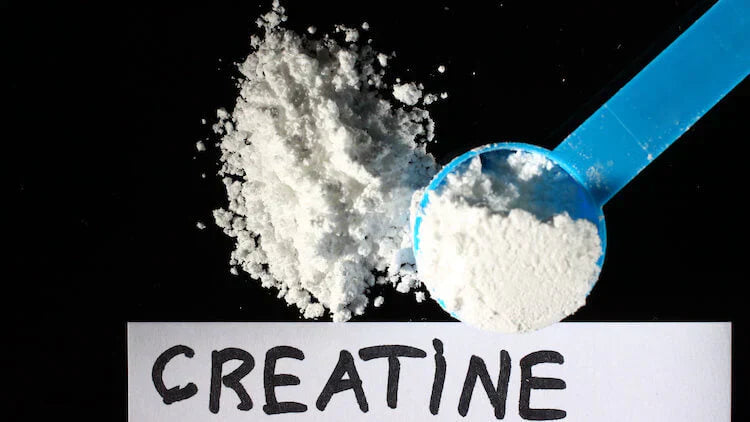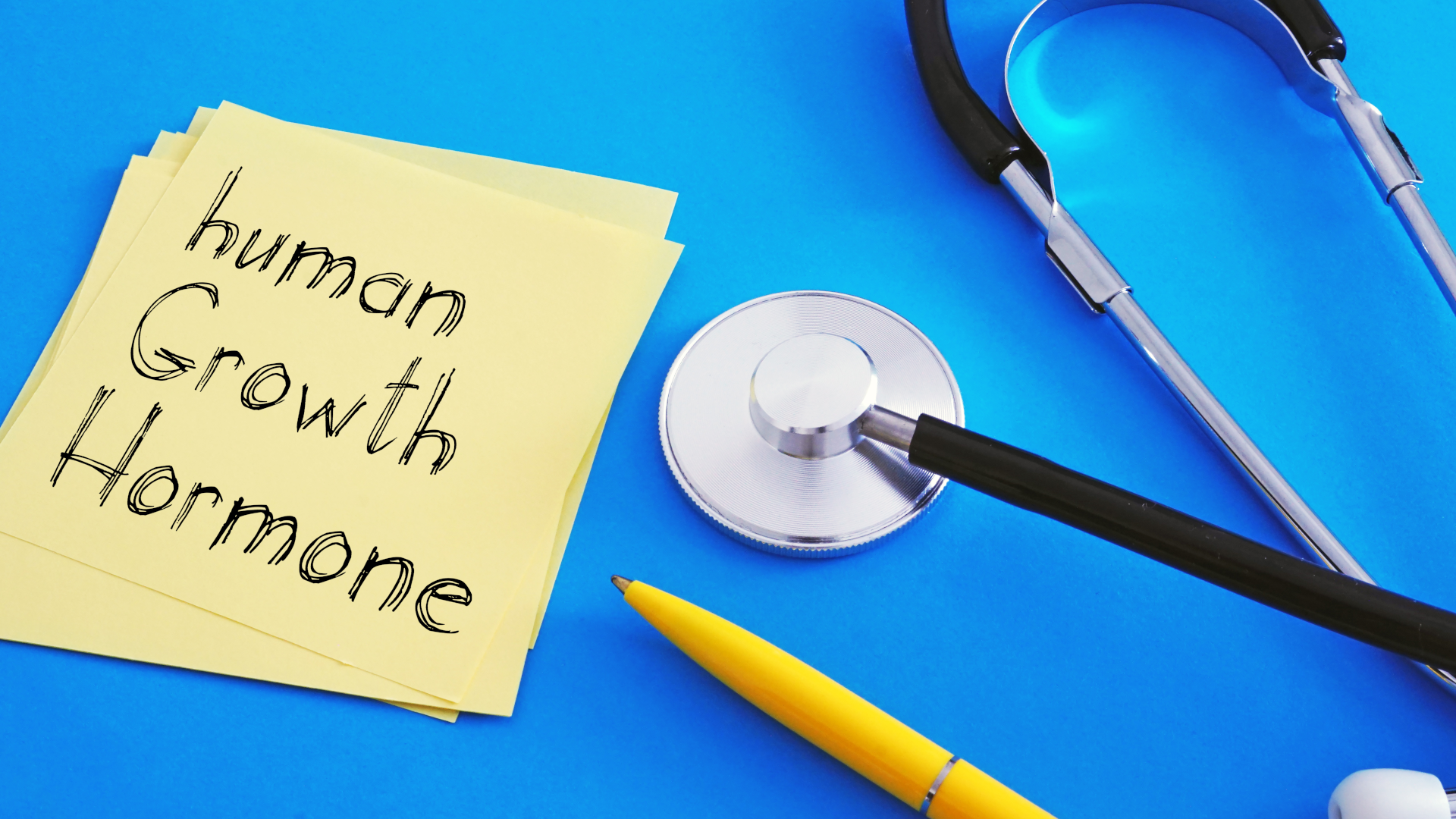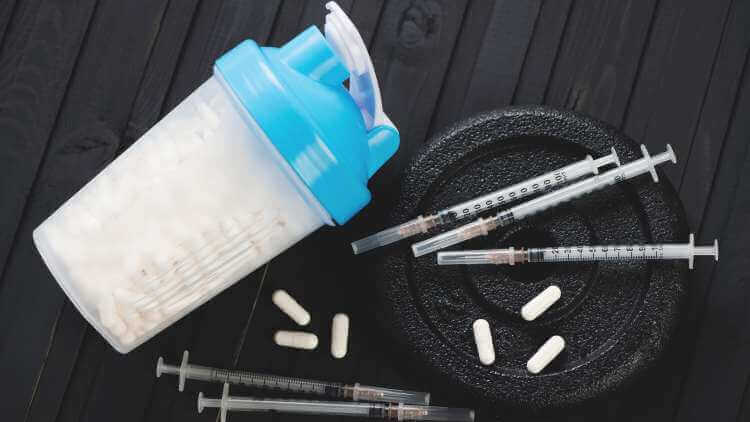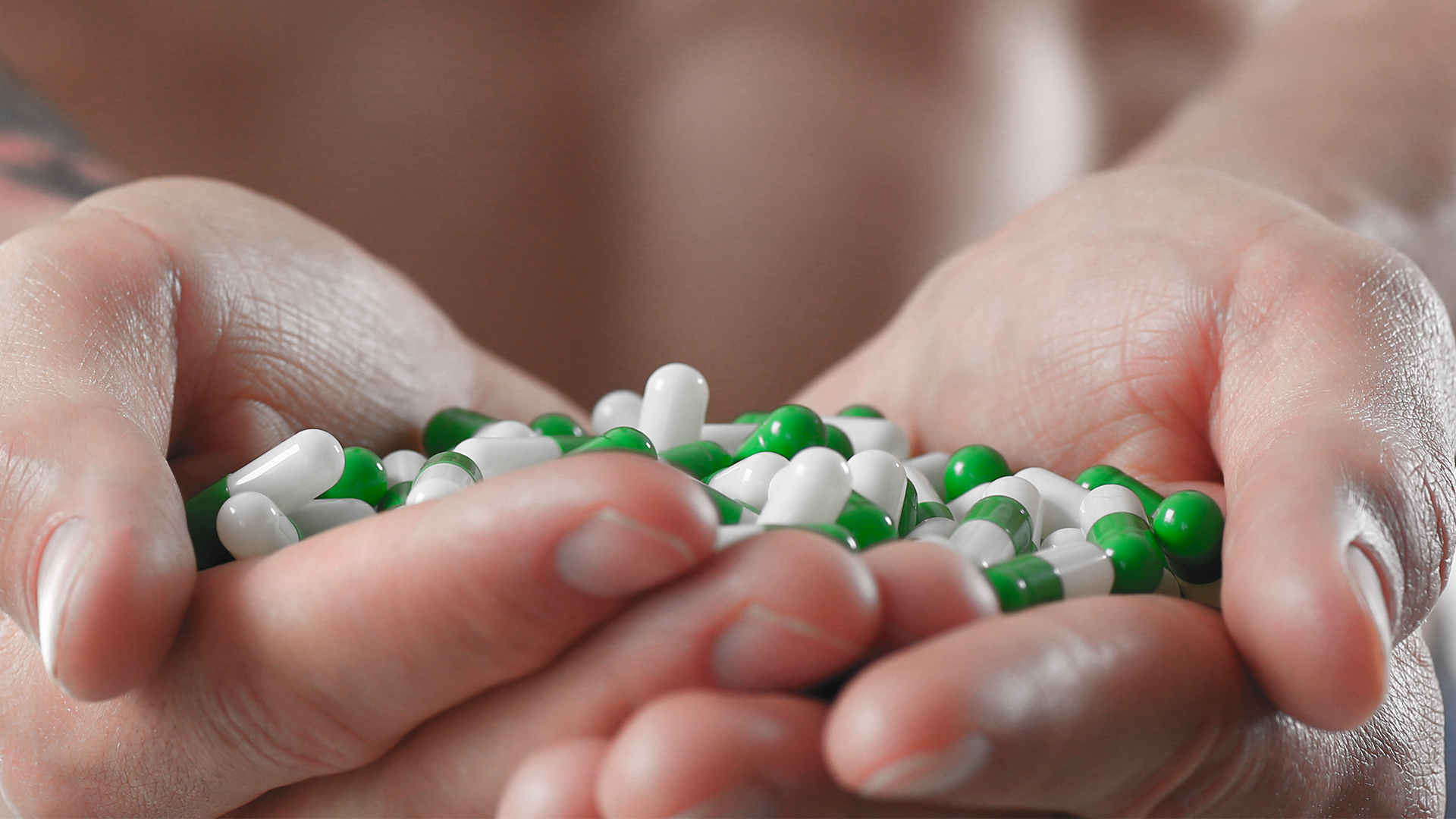So you are curious about creatine? You want to know when to take creatine to get optimum bodybuilding results so you can make the most of it. Should you use it before your exercise, or would after be better? Does it even matter; can you maybe just take it whenever you like? We’ve got the answer for you. Trust me, you want to read this!
Why take creatine? The benefits
So when should I take creatine?
Should you take anything else with it?
How to dose creatine for good results

What is creatine?
Creatine is a popular performance enhancing supplement used by bodybuilders, gym enthusiasts and athletes to help improve their strength, weight lifting capabilities and muscle mass.
It is a substance – produced by amino acids (glycine and arginine) – that is naturally found in your muscle cells, whose job is to produce energy (high energy molecule ATP) during intense physical activity and heavy lifting. In fact, 95% of your body’s creatine is stored in your muscles in the form of phosphocreatine (the other 5% can be found in your brain, kidneys and liver).
Now these stores can be affected by a number of things, but most importantly by how much exercise you do, the meat you eat, your muscle mass, and your testosterone and IGF-1 levels. And this is important as the more ATP you have, the better equipped you’ll be to work harder in the gym.
Basically what happens is that, during high intensity exercise, creatine helps to increase your phosphocreatine stores in your muscles. These extra stores can then be used to create additional ATP, which is an essential energy source for muscular contraction.
Creatine can also influence cellular processes which can lead to increased muscle mass, strength and muscle recovery, making it an ideal supplement for bodybuilders.
The science:
Creatine can improve your muscle mass by:
- Boosting your workload (allowing you to do more work during one session)
- Increasing satellite cell signalling (encouraging muscle repair and new muscle growth)
- Raising the production of anabolic hormones IGF-1
- Increasing water content/hydration in your muscles cells causing cell volumization (which can influence muscle growth)
- Lowering myostatin levels (bolstering muscle growth) and reducing protein breakdown.

Why take creatine? The benefits
Creatine may be well known for its muscle building capabilities, but this nutrient has got some other tricks up its sleeve as well.
So before you ask yourself “when should I take creatine” you might first want to consider “why take creatine”:
- Memory support – 5% of your natural creatine stores can be found in your brain. And this is good news as it can improve your concentration/focus and help protect you against neurological diseases.
- Physical performance – in many ways creatine can supply your body with the fuel it needs to over perform and workout harder, as it can offer you bursts of speed and energy.
- Increased lean muscle mass – creatine prevents the breakdown of protein, offering your muscles added protection against muscle loss.
- Hastened muscle recovery during exercise.
- Improved strength – studies have shown strength gains of 5-10% when combined with weight training.
- Anti-aging properties – alongside bolstering muscle recovery, creatine can also replenish and create new cells, improving their overall elasticity.
- Treatment of health conditions caused by weakened muscles: heart failure/heart attack; Huntington’s disease, muscular dystrophy and amyotrophic later sclerosis (ALS).
- Lower high cholesterol levels.

So when should I take creatine?
So we answered the question “why take creatine”; now let’s move on to the question you want the answer to the most: “when to take creatine?”
Supplementing on days you exercise
On days when you hit the gym, exercise or simply lift weights, you’ve got three options on when to take creatine:
- Shortly before you exercise – preferably 30 minutes before you start your workout (take 5g in one dose).
- Shortly after you exercise – this should be no later than 30 minutes after you have finished exercising (again take 5g in one dose).
- At a time that isn’t close to when you want to exercise (so basically in the morning or in the evening) – this option rests on the theory that taking creatine just before or after exercise is supplementation superstition. Remove exercise, and creatine is still good for you – so why put so much pressure on nutrient timing and when is the best time to take creatine? Instead, simply split your dose into small portions and take it throughout the day.
Of these three, the latter produces the weakest results. In one 10 week study, participants who took creatine in the evening gained less strength and muscle mass than those who took the supplement just before/after they exercised.

What does research say about timing?
Several studies have investigated the impact of creatine timing on exercise results. One study examined whether taking creatine before or after working out led to better muscle gains and strength increase. Over a four-week period, adult men who took creatine post-exercise experienced greater improvements in lean mass compared to those who took it pre-exercise. However, other research has shown negligible differences, indicating that the timing may not be crucial for everyone.
Another study offered additional insights, involving a supplement mix of creatine, carbs, and protein. Participants who consumed this mix around their workout sessions experienced more significant muscle and strength gains than those who took it at other times of the day, like in the morning or evening.
So, should you take it after you exercise?
There are definitely some perks to taking creatine after exercise, the primary being its ability to increase muscle recovery.
Remember, after hitting the gym hard your muscles will be torn up, beaten, and completely depleted of essential nutrients – you will have pushed your muscle fibers to the limit.
Taking creatine post-workout can provide your starving muscle cells with the fuel, i.e., the nutrients it needs to repair these torn muscle fibers, build muscle, and retain your lean mass gains. This is especially true if you take a creatine supplement that has been paired with carbohydrates and protein.
In fact, a study focused on adult men found that those taking creatine after their workouts saw greater increases in lean mass and strength. While some research shows no significant difference between taking it before or after exercise, this study suggests a potential edge for post-exercise supplementation.
What about shortly before your exercise?
Again, there is merit to this idea.
Think about it…
By taking creatine just before you train, you can instantly supply your muscle cells with enough phosphocreatine to handle even the craziest of workouts. Instead, your cells will be able to readily transform it into ATP – energy – and give your routine all the fuel it needs to succeed.
More creatine = More ATP = More lifting power (from activating your muscle fibers) = bigger muscles.
Perfect!
What does the research say about timing?
Interestingly, a 10-week study involving creatine, carbs, and protein supplements split participants into two groups. One group took their supplements close to exercise, while the other did so in the morning and evening, away from exercise. The results? Those who supplemented around their workouts gained more muscle and strength. This suggests that timing your creatine intake near your exercise routine could be more effective.
So when is the best time to take creatine?
If we’re brutally honest – whenever!
As long as you take it just before or after your exercise, it doesn’t matter which one you choose as you will still experience the EXACT SAME RESULTS. The only time it isn’t beneficial for strength and muscle building is if you take it nowhere near exercise.
In conclusion, while research continues to explore the nuances, it seems that timing your creatine intake close to your workouts, whether before or after, maximizes its benefits.
What about shortly before your exercise?
Again, there is merit to this idea.
Think about it…
By taking creatine just before you train, can instantly supply your muscle cells with enough phosphocreatine to handle even the craziest of workouts. Instead, your cells will be able to readily transform it into ATP – energy – and give your routine all the fuel it needs to succeed.
More creatine = More ATP = More lifting power (from activating your muscle fibers) = bigger muscles.
Perfect!
Supplementing on rest days
Obviously, supplementing on rest days is less important than on exercise days, but this doesn’t mean you can’t still benefit from it.
Consider it…
If you’re determined to keep creatine at optimal levels, then it makes sense to use these rest days to keep the creatine content in your muscles elevated. For that reason, split your creatine dose in two and take one in the morning and one in the afternoon (no more than 5g in one day).
Is It Important to Take Creatine with Food on Rest Days?
When it comes to taking creatine on rest days, the focus shifts from timing to optimal absorption. While it's not crucial to take creatine with food on these days, doing so can be beneficial.
Why Consider Food?
-
Improved Absorption: Consuming creatine with a meal, particularly one that includes carbohydrates, may enhance absorption. Carbs increase insulin levels, which can help transport creatine to the muscles more effectively.
-
Routine and Convenience: Taking creatine with a meal ensures you don't forget your daily dose. It's easier to integrate into your daily routine, especially if you're accustomed to taking supplements with breakfast or lunch.
-
Digestive Comfort: Some people find that taking creatine on an empty stomach causes slight digestive discomfort. Pairing it with food minimizes this risk.
In summary, while not essential, taking creatine with food on rest days can offer absorption advantages and enhance overall convenience. This approach can also contribute to a more consistent supplementation routine, supporting long-term muscle health and performance.
So when is the best time to take creatine?
If we’re brutally honest – whenever!
As long as you take it just before or after your exercise, it doesn’t matter which one you choose as you will still experience the EXACT SAME RESULTS. The only time it isn’t beneficial for strength and muscle building, is if you take it nowhere near exercise.
All you need to remember is: NEVER take more than 5g of creatine a day (if you aren’t loading).
Should you take anything else with it?
Whilst our bodies can create a large portion of creatine on its own; you can help supplement this store with your dietary choices. Meat and fish, for example, are a great way to boost these levels as they are rich in carbs and protein.
Yet this is not all you can do to optimize your results. You can also try investing in creatine supplements that have been formulated using protein, carbs, amino acids, cinnamon, and a variety of plant-based compounds. Each of these can help to increase the effectiveness of creatine.
Now, most creatine supplements already contain protein and carbs, as carbs in particular can increase how much creatine is taken up by your muscles.
While this can be beneficial, there's a potential downside to consider: consuming creatine with additional carbohydrates might lead to an intake of too many calories. This could put you at risk for weight gain if those calories aren't burned off.
For instance, in one study, participants were encouraged to have 100g of carbs per day alongside creatine—that's 400 extra calories. Unless you're planning to engage in activities to burn off those calories, you could find yourself piling on the pounds.
Therefore, it's crucial to balance your diet and activity level to avoid unintended weight gain while reaping the benefits of creatine supplementation.
.
Combining Creatine with Meals
To effectively combine creatine with your meals for better results, consider taking it alongside a carb-containing meal. This practical approach helps your body absorb the creatine more efficiently without needing to add extra carbs beyond your regular diet.
Including a healthy amount of protein in this meal is also advisable, as protein and amino acids may enhance your body's ability to retain creatine.
Mindful Calorie Consumption
If your creatine supplement already includes carbs, you need to be cautious with your diet. Excessive carb intake can lead to weight gain if you don't burn off the extra calories. For instance, one study suggested that participants consume 100g of carbs per day with creatine—equating to 400 extra calories. Without adequate physical activity, this could result in unwanted weight gain.
The safest strategy is to integrate creatine into a normal carb-containing diet but avoid excessive carbs. Similarly, ensure you consume enough protein to maintain a beneficial level of amino acids to assist in creatine retention.

How to dose creatine for good results
We’ve talked a little about creatine dosage already, but to truly understand when to take creatine and whey protein, you should follow this dosing plan. Do this and you can maximize your results:
- You should load for only 5-7 days to help saturate your cells with creatine. Typically, dosages during this loading phase should be 20g per day, which you split into four 5g servings. NOTE: technically you can skip the loading phrase and just stick to use 3-5g of creatine per day; however, it will take you a full 3-4 weeks to maximize your stores.
- For the following period, you should take 3-5g of creatine per day as this will help to maintain your creatine levels (the exact amount you will need to have will depend on your weight).
Now the great thing about creatine is that there is no need to cycle. You can basically stick to just 3-5g of creatine per day (for as long as you need) to help build up muscle and increase your lean tissue mass.
Just remember to drink plenty of water with each dose (to keep yourself hydrated) as creatine has a habit of pulling water into your muscle cells.
Read also: Is it better to use creatine pills or powder? >>
FAQs
1. What is the summary conclusion regarding creatine timing based on current research?
The current research suggests that taking creatine close to exercise, either before or after, is likely more beneficial than taking it at other times. However, due to the limited and sometimes conflicting research, the precise timing for optimal results remains unclear.
2. What are the effects of taking creatine at times unrelated to exercise?
Taking creatine at times not closely related to exercise may be less effective for muscle and strength gains. Research indicates that supplementing close to exercise results in better outcomes compared to taking it during unrelated times, such as in the morning and evening.
3. Is there a consensus on the best time to take creatine?
There is no clear consensus on the best time to take creatine due to limited research. While taking it close to your workout might be advantageous, the existing studies do not provide a definitive answer on whether before or after exercise is superior.
4. Are there any significant differences in outcomes when taking creatine before or after exercise?
The outcomes of taking creatine before or after exercise are not significantly different according to some research. One study found greater increases in lean mass and strength when creatine was taken after exercise, while other studies have reported no noticeable difference between the two timings.
5. What does research say about the timing of creatine supplementation?
Research on the timing of creatine supplementation suggests that taking it close to your workout may be beneficial. Specific studies have looked into the effects of consuming creatine before versus after exercise, with mixed results. Some studies indicate that timing can influence muscle and strength gains, though the findings are not entirely conclusive.
Over 299,434 purchases
Over 509,389 bottles sold
Over 30,563,340 pills taken








